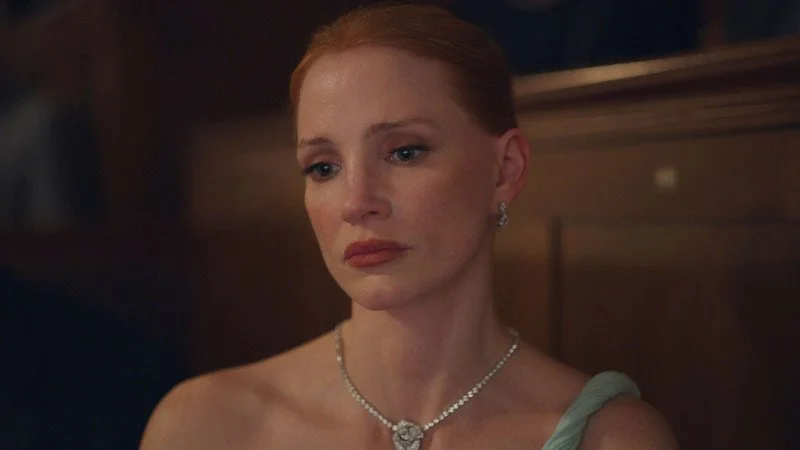MIFF 2025 | ‘Dreams’ review: Michel Franco returns with blisteringly nihilistic class critique
Jessica Chastain reunites with Mexican cinema’s enfant terrible for a furious and frothing examination of the cross-sections between race, social class, and power.
Jessica Chastain in “Dreams.” Photo courtesy of the Melbourne International Film Festival.
Michel Franco is no stranger to comforting the disturbed and disturbing the comfortable. The Mexican director has accrued his fair share of devotees and detractors over the past decade and a half, with the majority of criticism being levelled at his ultraviolent, controversial COVID-year offering, “New Order.” Now, after having explored more tender frontiers in his past two films, Franco’s briefly-forgotten capacity for cruelty is back with a vengeance; teeth bared from start to finish as his distant, formalistic directing style barely hides the simmering undercurrent of rage beneath.
“Dreams” treads some familiar ground from Franco’s past pictures, exploring the delicate balance between power, money, status, and love — or, depending on how you look at it, lust and delusion masquerading as love. Fernando (Isaac Hernández), a Mexican ballet dancer, risks life and limb to reach the cold, clinically palatial San Francisco townhouse of his clandestine lover, wealthy philanthropist Jennifer (Jessica Chastain). Life as an illegal immigrant in today’s America is fraught, but Fernando chafes against the notion of being Jennifer’s kept plaything for the rest of his life, all while Jennifer herself plots a deeply cruel betrayal meant to preserve both her future with Fernando, and the carefully-crafted life of wealth and privilege that she has built for herself. Such hubris, of course, comes with terrible consequences — but for whom? And how deserving are Fernando and Jennifer of the punishments eventually meted out to them?
One of the most remarkable things about Franco’s writing is the complete lack of filler in his films, most of which barely blow past a tight 90 minutes. “Dreams” is no exception. Nothing here is ancillary to Fernando and Jennifer’s rapidly unspooling relationship; we are not forced to languish in self-indulgent navel-gazing or unnecessary thematic bloat. Instead, the film’s careful pacing and the stark distance that Franco leaves between the camera and his characters invites the audience to focus on the minutiae of everyday human behaviour; small gestures — an offhand, off-kilter glance; the subtle dropping of a hand — that speak louder than words to articulate the cracks in the saccharine, libidinous veneer of Jennifer’s connection with Fernando. Chastain’s lead performance is unusually muted for an actress of her calibre — the emotional range from her stellar turn in Franco’s previous film “Memory” is nowhere to be seen here — but this is due to most of the film’s real emotional action taking place on a much more granular level, which in itself is an exciting departure from the sweeping melodrama that other directors might choose to inject into such maudlin source material.
The film’s conclusion is unusually cruel, even for Franco, and his stationary camera’s unsympathetic malingering on a shocking scene of sexual violence is questionable — it does feel like his intended message about debased patriarchal instincts coming head to head with the deep-rooted corruption of wealth and power could still have been served with a more tasteful cutaway. But, in a way, disagreeing with his methods here only heightens the roiling sense of injustice that viewers are met with once the film cuts to black. “Dreams” end with both a bang and a whimper, and nobody deserves the violence they are met with — a tragedy, and yet also just another day in contemporary America, where the rich think nothing of crushing the poor.
To call this a return to form for Franco would be ungenerous — direct comparisons to the quiet existentialism of “Sundown” and the aching tenderness of “Memory” would be akin to comparing apples to oranges. But “Dreams” is most definitely a level up from the polarising, brute-force approach that “New Order” took to critiquing our social ills. It even takes a step further, evolving into a furious, frothing examination of race and class, and laying bare the insidious pipeline between white feminism and the saviour complex fetish. Now, would only that Franco were to avoid giving into the very cycle of pain he clearly abhors with a less gratuitous deployment of high-impact sexual violence… maybe, then, his work will finally be able to contend for the status that it is so clearly striving for.
